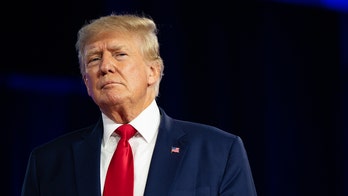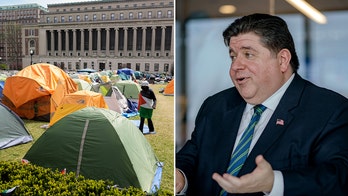The possibility of the U.S. and five other nations reaching a nuclear deal with Iran by this week’s deadline began to fade Sunday with reports that diplomats are now discussing an extension.
Secretary of State John Kerry and the other world leaders have started internal discussions on extending the talks -- one day before the Monday deadline for a deal attempting to cap Iran's nuclear activities in exchange for lifting sanctions on the Islamic Republic.
Two diplomats said Sunday that formal extension discussions have not yet started with Iran. But the U.S., Russia, China, Britain, France and Germany have started talks among themselves on approaches they could present to Tehran.
At the same time, formal talks with Iran on bridging the differences are continuing.
The Wall Street Journal, citing a senior Western diplomat, reported this weekend that reaching a final agreement by a Monday deadline was "impossible," though a deal setting out the key principles of a final agreement is not out of reach.
Reuters is reporting that Iran's semi-official ISNA news agency quoted a member of that country's negotiating team who also said an agreement by Monday was "impossible."
"Considering the short time left until the deadline and number of issues that needed to be discussed and resolved, it is impossible to reach a final and comprehensive deal by Nov. 24," the official is quoted as saying. "The issue of extension of the talks is an option on the table and we will start discussing it if no deal is reached by Sunday night."
On Saturday, Kerry said that "serious gaps" between the two sides existed, while his German counterpart, Frank-Walter Steinmeier, said the success or failure of the talks is "still completely open at this point."
Kerry spoke by telephone on Saturday to Arab foreign ministers in the Gulf, whose countries fear Iran's potential abilities to make nuclear arms, and with his Canadian and Turkish counterparts, the U.S. State Department said. He also talked Israeli Prime Minister Benjamin Netanyahu by phone.
Officials from the so-called P5+1 countries are seeking guarantees that Iran cannot produce enough material for a nuclear weapon in exchange for lifting economic sanctions on Tehran. An interim agreement reached last year between the parties put curbs on Iran's nuclear program in exchange for some sanctions. The agreement was extended again this past July, giving both sides the new deadline of Monday.
The Journal reports that the two key sticking points in the talks appear to be the speed of sanctions relief and the amount Iran would reduce its production of nuclear fuel. Iran wants most U.S., E.U., and U.N. sanctions to be lifted if and when a deal is reached, but the West has said that sanctions levied by the U.N. in response to Iran's nuclear program can't be lifted before Iran has proven it is sticking to the agreement.
As for enrichment, Western officials have told the Journal that any permanent agreement must ensure that Iran is at least a year away from producing enough nuclear material to build a nuclear bomb.
Meanwhile, The New York Times is reporting that Western intelligence agencies are attempting to insert language into the text of a proposed deal that would ensure inspections tracking the parts and fuel to and from any Iranian nuclear complex. Iran has three major "declared" nuclear facilities. However, there is at least covert facility in Iran, and U.S. officials believe that any nuclear bomb made by Iran would likely come from those places.
One of those covert facilities, known as Fordo, was outed by President Obama in 2009. The second such facility, at the city of Natanz, is believed to contain thousands of uranium-enriching centrifuges In the interim, Western intelligence agencies have looked for signs of another such facility, with no luck so far.
The Associated Press contributed to this report.





